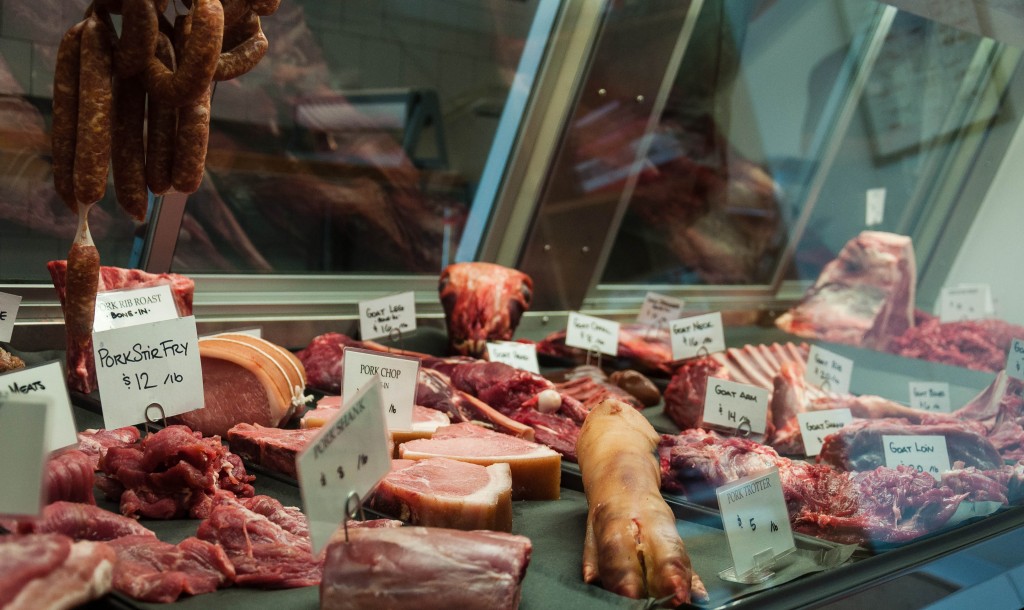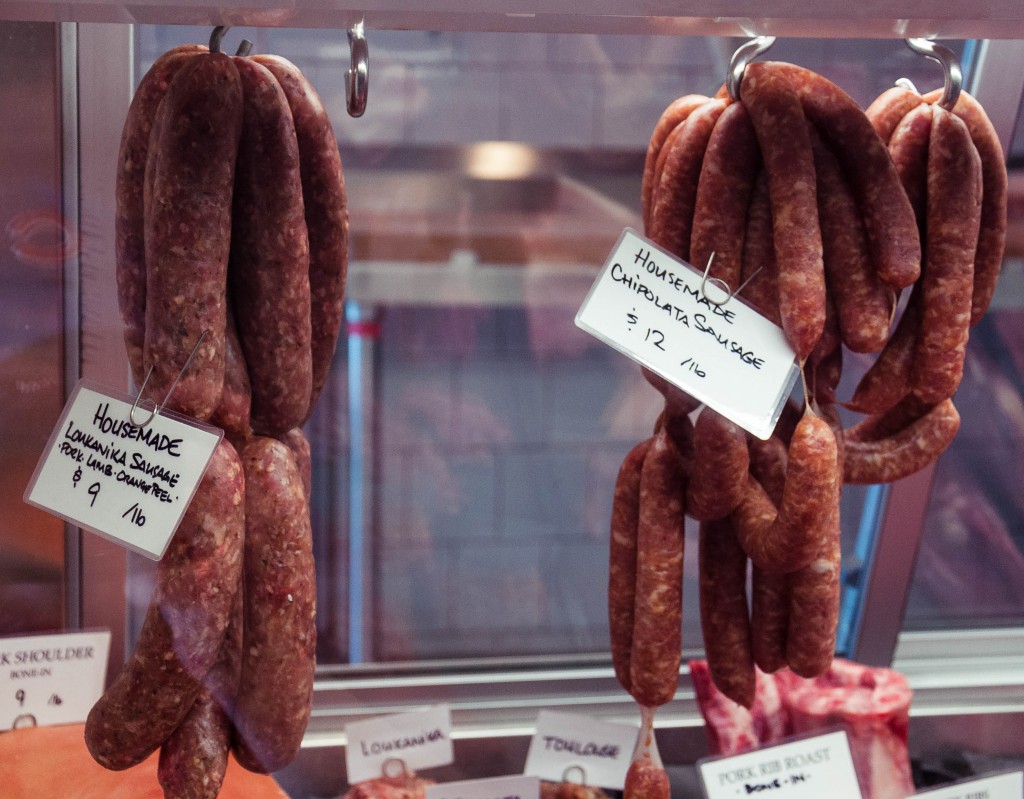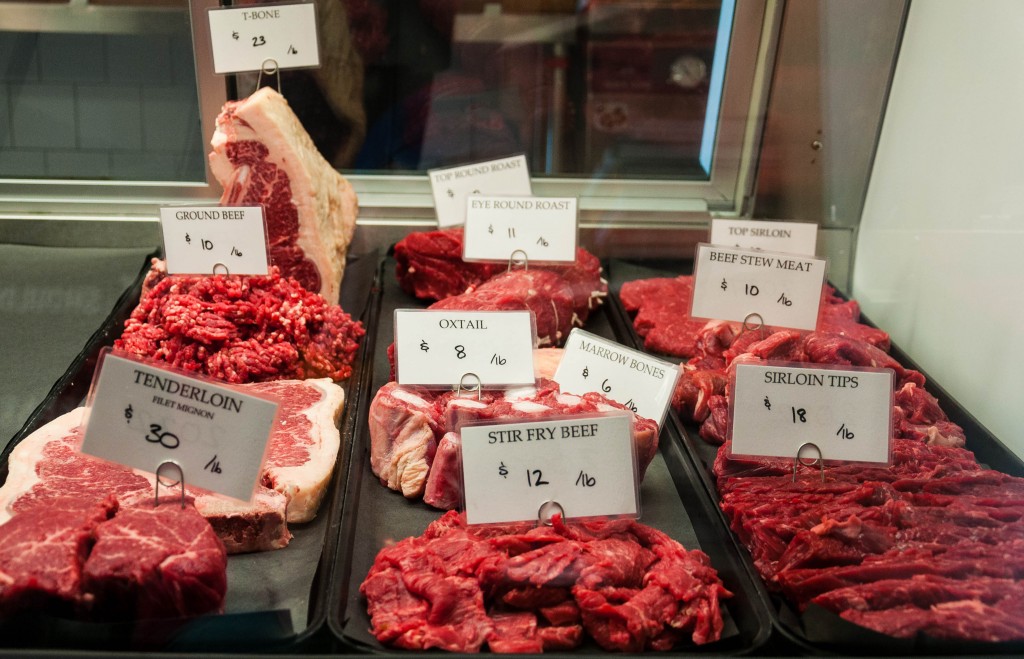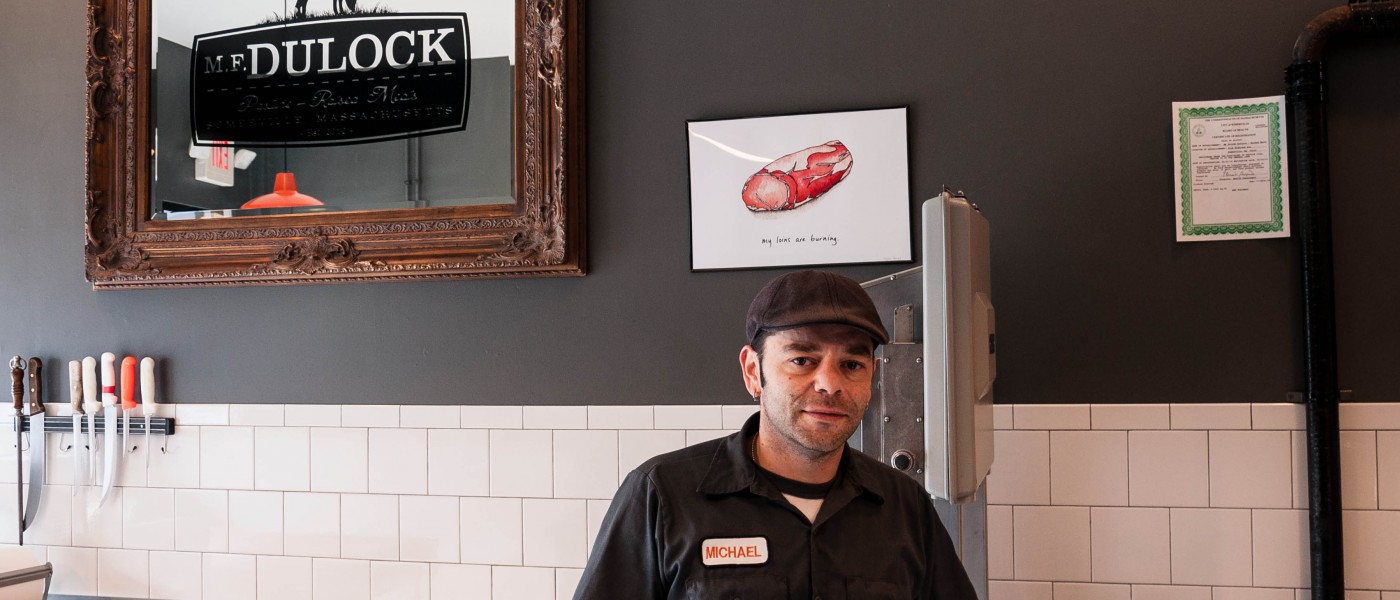“Where can I get local meat? How can I find grassfed beef?” My usual answer to that is, “At the farmers market!” or “Join a meat CSA!” But what if it’s Thursday evening and your farmers market is on Tuesday afternoons? Or you haven’t quite gotten around to filling out that CSA application yet? If you happen to be in the Boston area, a new option just opened up in the form of a butcher shop that only sells pasture-raised meat from animals raised within 250 miles (and often a whole lot closer).
A few of us around the Farm Aid office have been looking forward to having another good source of meat in town, so I stopped by M.F. Dulock Pasture-Raised Meats in Somerville and had a chat with Mr. Michael Dulock himself about how he’s putting it into practice at the shop and the philosophy behind the choices he’s made. I also picked up a little sausage for dinner.
Wouldn’t it be easier to get meat from a “normal” distributor? What inspired you to go to the effort of sourcing pasture-raised animals from local farmers?
It would in fact be much easier to source meat through traditional distribution channels, but easier doesn’t mean better. Prior to opening M.F. Dulock Pasture-Raised Meats, I was the owner of Concord Prime & Fish in Concord, MA. My Concord store offered both pasture-raised meats and USDA Prime beef. My experience using traditional commodity meats was less than satisfying. I was limited to thecuts I could offer my customers and was subject to purchase larger quantities of meat then any one animal could produce. I couldn’t find a way to reconcile the equation with myself. I kept feeling like there was a better way to sell meat. I took some time to look more closely at my whole-animal program and decided that there was more freedom in purchasing the entire animal. I closed Concord Prime & Fish in May 2012 to open M.F. Dulock.
Do you think the “local meat” angle is what draws most customers to your store? Or do more of them learn about it once they’re already there?
I wish I had the answer to that question. I would be a marketing genius and a much wealthier man.
It’s difficult to say what collateral material a new customer has seen before they make the decision to check us out. I believe that consumers are more cognizant of where their food is being produced and by which method. Part of our mission is to help bridge the gap between farmers and consumers. We want the general public to have access to the details. In order to fulfill that mission, we spend a great deal of time with our customers helping them understand the inner workings of the meat industry. We don’t offer a bias between conventional agriculture and local agriculture, but we do offer an explanation of why we choose to offer local products.

What are the most common questions customers do ask when they come into the store?
In order of number of times asked: (With answers)
- Do you sell poultry? (No)
- Where do you get your meat from? (Local farms within 250 miles of our shop)
- Is the meat grass-fed? (Sort of. We offer pasture-raised meats which to us means that the animal has had access to pasture throughout it’s entire life.)
- What are you hours? (Tuesday – friday 11-7, saturday 10-6)
- What does the MF stand for? (It’s my initials)
Have you had any challenges trying to find farmer sources for animals?
There are challenges with every business. Farmers tend to spend a great deal of time in the fields, which means they don’t always answer the phone or respond to emails. Knowing this, we have adapted to their preferences and work around it. I really believe that we are successful in finding farmers because I spend a fair amount of time networking. More than a meat business, this is a people business.

How many farmers are you working with? How do you find them?
I’m currently working with 20 or so farmers. This number is increasing as I spend each day trying to contact a new farmer. I find them through personal referrals, breed associations, and through fairs. The internet is also a great tool to do research. I’ve actually started a relationship with two new farmers via Facebook.
What kind of feedback have you heard from farmers?
Generally speaking, the farmers are seeking feedback from me. They want to know how their animal performed. They want to know what our customers are saying about their meat. The information helps them continue doing what they do well and adapt to changes in areas where they may need some help. What I do hear is that they are happy to have a retail outlet to sell their meat without the burden of the farmer’s market.
You guys don’t sell poultry. How come?
Poultry is messy, our space is quite small and being able to adequately prevent cross-contamination would be extremely difficult. I’ve thought about adding a poultry offering, but haven’t put too much effort into bringing the program to life. We really need to establish ourselves for what we do well and then consider adding lines. In the short term, I have no intention of offering poultry.

What’s a typical day like at your job?
There really isn’t a typical day around here. My staff is very helpful and competent so my cutting duties are much lighter. This gives me time to focus on marketing the business and researching new farms. I’d say that the majority of my time is spent coordinating slaughter dates, delivery schedules, etc and being the face of a new company. I tend to spend time with my customers answering questions and giving them the history of our company. I guess I spend most of the day talking to people trying to keep the business running.
Every year at Farm Aid concerts, we go to a lot of effort to bring what we call HOMEGROWN Concessions (food from family farmers) to the show. If you were at your favorite concert and they brought in good food,what would you most like to eat?
I love to eat food I’ve never eaten before, local specialties and the like. I’m always looking to explore what is being offered and have a particular interest in multi-generational recipes, traditions so to speak.
Do you have any favorite recipes or unusual cuts of meat you enjoy at home that you’d like to share?
That’s like asking a parent to choose their favorite child…
I’m currently obsessed with lamb neck. It started a few years ago, mainly because I couldn’t sell the neck so I took some home and tried to figure out what to do with it. After some trial and error Maureene and I came up with a recipe that we are still using. We basically sear the neck, add carrots, onions, dried lentils and lamb stock, then braise it in the oven 250 degrees for three hours. The end result is a wonderful lentil puree with rich lamb meat.
Visit M.F. Dulock's website.

